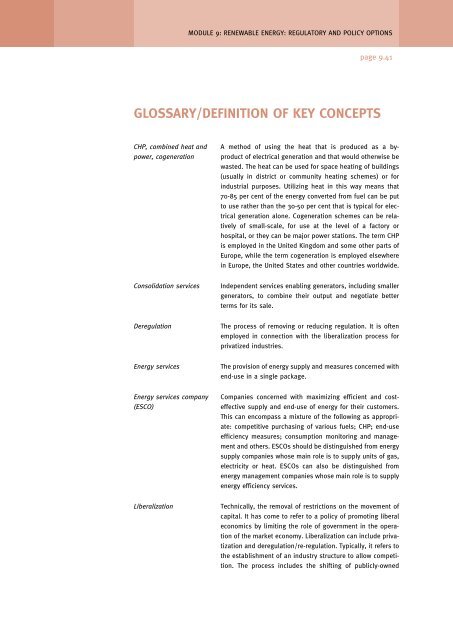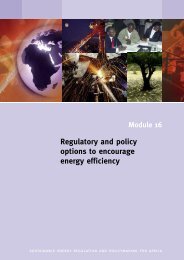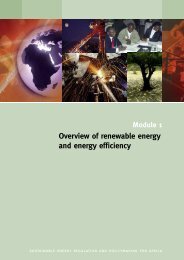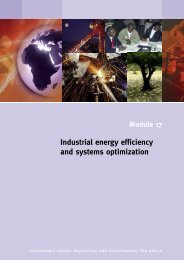Regulatory and policy options to encourage development of ...
Regulatory and policy options to encourage development of ...
Regulatory and policy options to encourage development of ...
- No tags were found...
You also want an ePaper? Increase the reach of your titles
YUMPU automatically turns print PDFs into web optimized ePapers that Google loves.
MODULE 9: RENEWABLE ENERGY: REGULATORY AND POLICY OPTIONSpage 9.41GLOSSARY/DEFINITION OF KEY CONCEPTSA method <strong>of</strong> using the heat that is produced as a by-product <strong>of</strong> electrical generation <strong>and</strong> that would otherwise bewasted. The heat can be used for space heating <strong>of</strong> buildings(usually in district or community heating schemes) or forindustrial purposes. Utilizing heat in this way means that70-85 per cent <strong>of</strong> the energy converted from fuel can be put<strong>to</strong> use rather than the 30-50 per cent that is typical for electricalgeneration alone. Cogeneration schemes can be relatively<strong>of</strong> small-scale, for use at the level <strong>of</strong> a fac<strong>to</strong>ry orhospital, or they can be major power stations. The term CHPis employed in the United Kingdom <strong>and</strong> some other parts <strong>of</strong>Europe, while the term cogeneration is employed elsewherein Europe, the United States <strong>and</strong> other countries worldwide.CHP, combined heat <strong>and</strong>power, cogenerationConsolidation servicesIndependent services enabling genera<strong>to</strong>rs, including smallergenera<strong>to</strong>rs, <strong>to</strong> combine their output <strong>and</strong> negotiate betterterms for its sale.DeregulationThe process <strong>of</strong> removing or reducing regulation. It is <strong>of</strong>tenemployed in connection with the liberalization process forprivatized industries.Energy servicesThe provision <strong>of</strong> energy supply <strong>and</strong> measures concerned withend-use in a single package.Energy services company(ESCO)Companies concerned with maximizing efficient <strong>and</strong> costeffectivesupply <strong>and</strong> end-use <strong>of</strong> energy for their cus<strong>to</strong>mers.This can encompass a mixture <strong>of</strong> the following as appropriate:competitive purchasing <strong>of</strong> various fuels; CHP; end-useefficiency measures; consumption moni<strong>to</strong>ring <strong>and</strong> management<strong>and</strong> others. ESCOs should be distinguished from energysupply companies whose main role is <strong>to</strong> supply units <strong>of</strong> gas,electricity or heat. ESCOs can also be distinguished fromenergy management companies whose main role is <strong>to</strong> supplyenergy efficiency services.LiberalizationTechnically, the removal <strong>of</strong> restrictions on the movement <strong>of</strong>capital. It has come <strong>to</strong> refer <strong>to</strong> a <strong>policy</strong> <strong>of</strong> promoting liberaleconomics by limiting the role <strong>of</strong> government in the operation<strong>of</strong> the market economy. Liberalization can include privatization<strong>and</strong> deregulation/re-regulation. Typically, it refers <strong>to</strong>the establishment <strong>of</strong> an industry structure <strong>to</strong> allow competition.The process includes the shifting <strong>of</strong> publicly-owned










